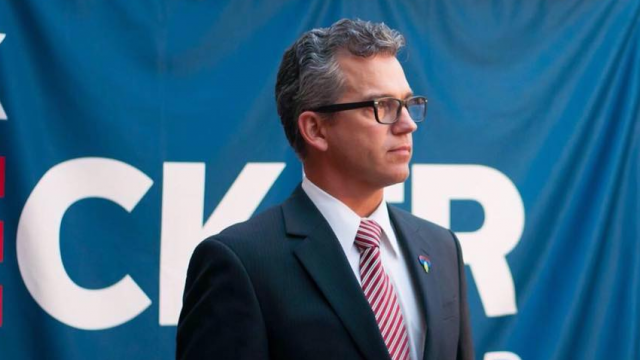Audio: Gov Candidate Rick Becker Says State Should Take Back Oversight Of Refugee Resettlement

That’s been a hot-button topic in North Dakota for some time now, all the more so because of refugees and immigrants getting radicalized by groups like ISIS.
Refugees
I asked Becker what he thought of Governor Jack Dalrymple’s call on President Obama to pause refugee resettlement from Syria in the wake of the Paris terror attacks. Becker said he thought it was an appropriate announcement, and he went a step further. He said the State of North Dakota should take back oversight of refugee resettlement.
“I’m not entirely satisfied in any way with how we’re handling it now,” Becker told me. “The state should take back control.”
He pointed out that Lutheran Social Services receives funds from both the federal government and the state for resettlement but that the state has no skin in the game. “The state gives money with no real oversight or control,” Becker said.
As I reported back in November, the states have the option to relinquish oversight over refugee resettlement per federal legislation called the Wilson-Fish Act. North Dakota relinquished control in 2011 during Dalrymple’s term in office, though the decision to do so was made in 2010 under former Governor John Hoeven.
Dalrymple has defended that move. “The only thing we did in the past was act as a fiscal pass-through agent for some federal funds,” he told talk radio host Scott Hennen. “We weren’t really involved in any screening processes or any actual execution of the programs.”
But to Becker’s point, if the state were to take back the resettlement program from Lutheran Social Services there would a) be state officials accountable for the resettlement not members of a private non-profit and b) the state would have oversight if not actual policy control when it comes to resettlement.
Property taxes
Becker told me that the voters he’s speaking to on the campaign trail are still upset about property taxes. Which is remarkable because our Legislature – along with Governors Dalrymple and Hoeven – have been trying to address the property tax issue since about 2007. The state is now buying down a half billion dollars or so worth of property taxes every biennium, so why aren’t people feeling the relief?
“What we did was well intentioned but it wasn’t the proper route,” Becker said of the state buy-downs. “The state tried to give taxpayers a break but it didn’t work.”
Becker expressed some concern about whether or not the state will be able to continue funding the property tax buy-downs in coming years what with revenues falling off. Which is a scary thought. It’s easy to hide a half-billion dollars or so of local spending in the state budget when you’re running billion dollar surpluses. But what happens when there is no surplus and the state is looking at a revenue shortfall?
You can bet that if the state cut its commitment to buying down property taxes in current years that those taxes would see a big hike.
Going forward, Becker said what he’d like to see is reform including tying valuations to inflation with a cap on increases at no more than 2.5 percent per year. Becker said he wouldn’t mind seeing taxable values of property decoupled from actual market value entirely. He also said he’d like to put a limit on how much a local taxing entity can increase their mill levy on property values without a vote of the people.




